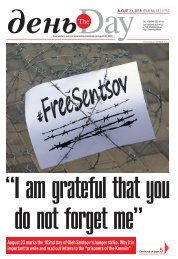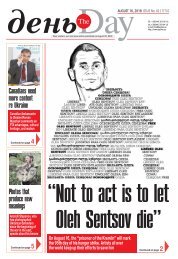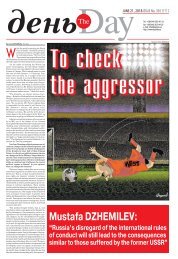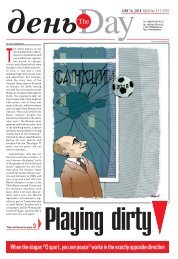#40_1-8
You also want an ePaper? Increase the reach of your titles
YUMPU automatically turns print PDFs into web optimized ePapers that Google loves.
2<br />
No.40 JUNE 26, 2018<br />
DAY AFTER DAY<br />
WWW.DAY.KIEV.UA<br />
By Ivan KAPSAMUN, Valentyn TORBA,<br />
photos by Ruslan KANIUKA, The Day<br />
Anew security law, “On<br />
National Security of<br />
Ukraine,” was passed in<br />
Ukraine last Thursday,<br />
with 248 MPs voting for<br />
the presidential bill. The previous<br />
law, “On the Fundamentals of<br />
National Security and Defense,” had<br />
been adopted as far back as 2003.<br />
According to Ihor Smeshko, former<br />
chief of the Security Service of<br />
Ukraine, the latter was “reasonable<br />
and balanced enough.”<br />
“The law was passed when General<br />
Yevhen Marchuk was Secretary<br />
of the National Security and Defense<br />
Council and I was his first deputy<br />
and, therefore, directly participated<br />
in drawing up the law. So, I wonder<br />
why we were never asked, as experts,<br />
to voice our opinion on the new<br />
bill. As is known, it calls for repealing<br />
three laws now in force,”<br />
Smeshko told The Day (article “On<br />
unity,” No. 21, April 3, 2018).<br />
The laws in question are “On the<br />
Fundamentals of National Security of<br />
Ukraine,” “On Democratic Civilian<br />
Control over the Military Organization<br />
and Law-Enforcement Bodies<br />
of the State,” and “On the Organization<br />
of Defense Planning.”<br />
What is written in the new law?<br />
Firstly, it lays down the basic principles<br />
of national security and defense,<br />
the objectives and guidelines<br />
of governmental policies which will<br />
guarantee society and every individual<br />
protection against dangers.<br />
More in detail, it specifies the President<br />
of Ukraine’s powers to exercise<br />
strategic command of the National<br />
Guard via the General Staff of the<br />
Ukrainian Armed Forces when martial<br />
law has been declared.<br />
The law also sets out that the<br />
minister of defense and his deputies<br />
are to be appointed from among civilians<br />
and that the offices of Chief of<br />
the General Staff and Commanderin-Chief<br />
of the Ukrainian Armed<br />
Forces will be separated. The Armed<br />
Forces’ commander-in-chief is to be<br />
appointed and dismissed by the president<br />
at the formal request of the defense<br />
minister to whom he is subordinated,<br />
while the chief of the General<br />
Staff is subordinated to the<br />
Armed Force’s commander-in-chief.<br />
The document is the first step in<br />
bringing the uniformed services into<br />
line with NATO standards. In particular,<br />
the status of the Security<br />
Service (SBU) is changing – from now<br />
on it will be a special body with lawenforcement<br />
functions, which ensures<br />
state security, while strictly observing<br />
the rights and freedoms of<br />
man and citizen. Investigating economic<br />
crimes is now beyond the<br />
SBU’s competence.<br />
However, this triggered heated<br />
debates in parliament. Particularly,<br />
MPs Hanna Hopko and Svitlana Zalishchuk<br />
insisted that changes about<br />
stripping the SBU of the function to<br />
combat corruption and organized<br />
crime be introduced directly to the<br />
law on the Security Service, but none<br />
of their amendments were supported.<br />
The law separates defense forces<br />
and security forces. From now on, defense<br />
forces are to take relevant<br />
measures to ensure defense of the<br />
state and military security, whereas<br />
security forces are supposed to ensure<br />
Ukraine’s state and community security.<br />
Besides, the Law “On National<br />
Security of Ukraine” introduces<br />
democratic civilian control<br />
over the security and defense sector,<br />
including on the part of the Verkhovna<br />
Rada and the public.<br />
The document says that allocations<br />
for the security and defense sector<br />
should make up at least 5 percent<br />
of the planned GDP, of which 3 percent<br />
will be spent on funding the<br />
Armed Forces.<br />
Ihor Smeshko is rather critical<br />
of the new law. “I can conclude<br />
from what I saw that it is in fact a<br />
collection of political slogans that do<br />
not explain the essence of the law’s<br />
name and considerably worsen governance<br />
in the sphere of defense<br />
and national security,” he says.<br />
(For more details, see the abovementioned<br />
interview.)<br />
Logically enough, the pro-presidential<br />
PPB faction came to a positive<br />
conclusion. According to MP<br />
Ivan Vynnyk, the bill signals the beginning<br />
of the Ukrainian army’s<br />
transition to NATO and EU standards.<br />
“An essential innovation is<br />
introduction of parliamentary and<br />
civil control over the Armed Forces<br />
and volunteer formations,” the party’s<br />
press service quotes the MP as<br />
saying.<br />
What do The Day’s experts think<br />
of the new draft law?<br />
● “IT WOULD HAVE BEEN<br />
BETTER TO PASS THIS LAW<br />
IN THE VERY BEGINNING”<br />
Dmytro TYMCHUK, Member of the<br />
Ukrainian Parliament:<br />
“The law on national security<br />
should lay the groundwork for all<br />
the reforms associated with the security<br />
and defense sector and aimed<br />
at Euro-Atlantic integration. We<br />
are really in the mess, for we have<br />
put the wagon ahead of the horse.<br />
There was a Ministry of Defense<br />
concept, and there was a Strategic<br />
Bulletin – already a road map for<br />
THE LAST CORRECTIONS<br />
carrying out reforms in line with<br />
Belatedbut indispensable<br />
What do The Day’s experts think of the new<br />
Law “On National Security of Ukraine”?<br />
NATO standards. These documents<br />
are being actively implemented today,<br />
and military control bodies<br />
are being reformed. But it is all details.<br />
We need a law that will basically<br />
determine interconnection between<br />
reformation processes and<br />
become a reference point of sorts for<br />
reforms in the sectors of security<br />
and defense. And it is very important<br />
to provide for the security and<br />
defense sector. It should be a single<br />
MEMBERS OF PARLIAMENT AFTER VOTING FOR THE LAW ON NATIONAL SECURITY<br />
body. The problem of interaction between<br />
the uniformed services has<br />
been very acute since the first days<br />
of Russia’s war against Ukraine.<br />
But, of course, it would have been<br />
better to pass this law in the very beginning.<br />
We are late here to some<br />
extent.<br />
“To tell the truth, there is a traditional<br />
rivalry between special services,<br />
between intelligence and other<br />
branches… And this rivalry has existed<br />
since the beginning of independence.<br />
Nobody wants a rivaling<br />
body to penetrate into an alien territory<br />
and begin to establish their own<br />
order. It is this approach that hinders<br />
interaction. Now our goal is to<br />
break these stereotypes and switch<br />
to NATO standards in the finest<br />
sense of the word. It is not the compatibility<br />
of gun calibers that matters<br />
to NATO. What really matters to<br />
them is effectiveness of defense and<br />
security in the country as a whole.<br />
The No. 1 thing is to standardize legislation,<br />
which we are busy with<br />
now. One should also take into account<br />
that NATO standards have<br />
been honed for dozens of years and<br />
are the most effective, and we need<br />
them not only for moving towards the<br />
Alliance but also, and first of all, for<br />
boosting the effectiveness of our security<br />
and defense sector.”<br />
● “IN REALITY, THIS LAW SETS<br />
OUT A RIGID CHAIN OF<br />
COMMAND FOR TWO<br />
PEOPLE – THE PRESIDENT<br />
AND THE RNBO<br />
SECRETARY”<br />
Valentyn NALYVAICHENKO, former<br />
chief of the Security Service of<br />
Ukraine:<br />
“In the text of the Law on National<br />
Security, I first of all see the<br />
increase of the existing and the provision<br />
of new supervisory powers of<br />
the National Security and Defense<br />
Council (RNBO) secretary. I can see<br />
strict subordination of security and<br />
defense powers to the president and<br />
the RNBO secretary.<br />
“Secondly, whether or not parliament<br />
wanted it, it is unexpected to<br />
me, and I don’t think it is a right<br />
measure – parliament gave up supervision<br />
over almost all the governmental<br />
bodies in the defense and<br />
security sector, including the SBU. It<br />
is accountability and many other<br />
ways of control. The law demands<br />
that all security agencies submit a<br />
written report to parliament once a<br />
year only. This innovation considerably<br />
narrows parliamentary control<br />
over the security and defense sector.<br />
“Thirdly, societal control. In reality,<br />
this law does not introduce<br />
any forms of societal control. On the<br />
contrary, it narrows them. Societal<br />
control is confined to participation in<br />
discussing certain matters – no more<br />
than this. I remind you that societal<br />
control in accordance with European<br />
norms is a possibility to monitor the<br />
legality of all the law-enforcement<br />
and security bodies’ activity. The<br />
law absolutely ignores this important<br />
moment. I think our European partners<br />
will first of all criticize us for<br />
failure to introduce this kind of societal<br />
control.<br />
“Fourthly and mainly, my expert<br />
opinion is that lawmakers did<br />
not dare write in the passed law that<br />
protecting the security of every individual<br />
is the No. 1 task of security<br />
and defense bodies. I emphasize this.<br />
This law is about national security,<br />
but where is security of the Ukrainian<br />
citizen?<br />
“In general, what is written in<br />
this law concerns the activities of<br />
RNBO. There is nothing new in it. In<br />
reality, the current law on national<br />
security set out a rigid chain of command<br />
for two people – the president<br />
and the RNBO secretary. But it still<br />
says nothing about counterintelligence<br />
or an antiterrorist center. Instead,<br />
this law simply repeats provisions<br />
of the existing laws – a juridical<br />
tautology of sorts.”
















